Elliptic functions¶
Elliptic functions historically comprise the elliptic integrals and their inverses, and originate from the problem of computing the arc length of an ellipse. From a more modern point of view, an elliptic function is defined as a doubly periodic function, i.e. a function which satisfies
for some half-periods
Many different conventions for the arguments of
elliptic functions are in use. It is even standard to use
different parameterizations for different functions in the same
text or software (and mpmath is no exception).
The usual parameters are the elliptic nome
In addition, an alternative definition is used for the nome in number theory, which we here denote by q-bar:
For convenience, mpmath provides functions to convert
between the various parameters (qfrom(), mfrom(),
kfrom(), taufrom(), qbarfrom()).
References
Elliptic arguments¶
qfrom()¶
- mpmath.qfrom(**kwargs)¶
Returns the elliptic nome
>>> from mpmath import * >>> mp.dps = 25; mp.pretty = True >>> qfrom(q=0.25) 0.25 >>> qfrom(m=mfrom(q=0.25)) 0.25 >>> qfrom(k=kfrom(q=0.25)) 0.25 >>> qfrom(tau=taufrom(q=0.25)) (0.25 + 0.0j) >>> qfrom(qbar=qbarfrom(q=0.25)) 0.25
qbarfrom()¶
- mpmath.qbarfrom(**kwargs)¶
Returns the number-theoretic nome
>>> from mpmath import * >>> mp.dps = 25; mp.pretty = True >>> qbarfrom(qbar=0.25) 0.25 >>> qbarfrom(q=qfrom(qbar=0.25)) 0.25 >>> qbarfrom(m=extraprec(20)(mfrom)(qbar=0.25)) # ill-conditioned 0.25 >>> qbarfrom(k=extraprec(20)(kfrom)(qbar=0.25)) # ill-conditioned 0.25 >>> qbarfrom(tau=taufrom(qbar=0.25)) (0.25 + 0.0j)
mfrom()¶
- mpmath.mfrom(**kwargs)¶
Returns the elliptic parameter
>>> from mpmath import * >>> mp.dps = 25; mp.pretty = True >>> mfrom(m=0.25) 0.25 >>> mfrom(q=qfrom(m=0.25)) 0.25 >>> mfrom(k=kfrom(m=0.25)) 0.25 >>> mfrom(tau=taufrom(m=0.25)) (0.25 + 0.0j) >>> mfrom(qbar=qbarfrom(m=0.25)) 0.25
As
>>> mfrom(q=0.75) 0.9999999999999798332943533 >>> mfrom(q=-0.75) -49586681013729.32611558353 >>> mfrom(q=1) 1.0 >>> mfrom(q=-1) -inf
The inverse nome as a function of
>>> taylor(lambda q: mfrom(q), 0, 7) [0.0, 16.0, -128.0, 704.0, -3072.0, 11488.0, -38400.0, 117632.0]
kfrom()¶
- mpmath.kfrom(**kwargs)¶
Returns the elliptic modulus
>>> from mpmath import * >>> mp.dps = 25; mp.pretty = True >>> kfrom(k=0.25) 0.25 >>> kfrom(m=mfrom(k=0.25)) 0.25 >>> kfrom(q=qfrom(k=0.25)) 0.25 >>> kfrom(tau=taufrom(k=0.25)) (0.25 + 0.0j) >>> kfrom(qbar=qbarfrom(k=0.25)) 0.25
As
>>> kfrom(q=0.75) 0.9999999999999899166471767 >>> kfrom(q=-0.75) (0.0 + 7041781.096692038332790615j) >>> kfrom(q=1) 1 >>> kfrom(q=-1) (0.0 + +infj)
taufrom()¶
- mpmath.taufrom(**kwargs)¶
Returns the elliptic half-period ratio
>>> from mpmath import * >>> mp.dps = 25; mp.pretty = True >>> taufrom(tau=0.5j) (0.0 + 0.5j) >>> taufrom(q=qfrom(tau=0.5j)) (0.0 + 0.5j) >>> taufrom(m=mfrom(tau=0.5j)) (0.0 + 0.5j) >>> taufrom(k=kfrom(tau=0.5j)) (0.0 + 0.5j) >>> taufrom(qbar=qbarfrom(tau=0.5j)) (0.0 + 0.5j)
Legendre elliptic integrals¶
ellipk()¶
- mpmath.ellipk(m, **kwargs)¶
Evaluates the complete elliptic integral of the first kind,
Note that the argument is the parameter
Plots
# Complete elliptic integrals K(m) and E(m) plot([ellipk, ellipe], [-2,1], [0,3], points=600)
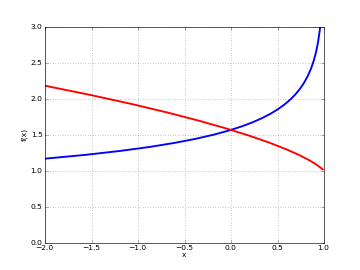
Examples
Values and limits include:
>>> from mpmath import * >>> mp.dps = 25; mp.pretty = True >>> ellipk(0) 1.570796326794896619231322 >>> ellipk(inf) (0.0 + 0.0j) >>> ellipk(-inf) 0.0 >>> ellipk(1) +inf >>> ellipk(-1) 1.31102877714605990523242 >>> ellipk(2) (1.31102877714605990523242 - 1.31102877714605990523242j)
Verifying the defining integral and hypergeometric representation:
>>> ellipk(0.5) 1.85407467730137191843385 >>> quad(lambda t: (1-0.5*sin(t)**2)**-0.5, [0, pi/2]) 1.85407467730137191843385 >>> pi/2*hyp2f1(0.5,0.5,1,0.5) 1.85407467730137191843385
Evaluation is supported for arbitrary complex
>>> ellipk(3+4j) (0.9111955638049650086562171 + 0.6313342832413452438845091j)
A definite integral:
>>> quad(ellipk, [0, 1]) 2.0
ellipf()¶
- mpmath.ellipf(phi, m)¶
Evaluates the Legendre incomplete elliptic integral of the first kind
or equivalently
The function reduces to a complete elliptic integral of the first kind (see
ellipk()) whenIn the defining integral, it is assumed that the principal branch of the square root is taken and that the path of integration avoids crossing any branch cuts. Outside
Plots
# Elliptic integral F(z,m) for some different m f1 = lambda z: ellipf(z,-1) f2 = lambda z: ellipf(z,-0.5) f3 = lambda z: ellipf(z,0) f4 = lambda z: ellipf(z,0.5) f5 = lambda z: ellipf(z,1) plot([f1,f2,f3,f4,f5], [0,pi], [0,4])
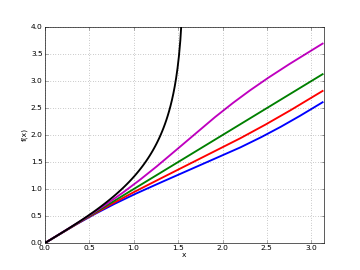
Examples
Basic values and limits:
>>> from mpmath import * >>> mp.dps = 25; mp.pretty = True >>> ellipf(0,1) 0.0 >>> ellipf(0,0) 0.0 >>> ellipf(1,0); ellipf(2+3j,0) 1.0 (2.0 + 3.0j) >>> ellipf(1,1); log(sec(1)+tan(1)) 1.226191170883517070813061 1.226191170883517070813061 >>> ellipf(pi/2, -0.5); ellipk(-0.5) 1.415737208425956198892166 1.415737208425956198892166 >>> ellipf(pi/2+eps, 1); ellipf(-pi/2-eps, 1) +inf +inf >>> ellipf(1.5, 1) 3.340677542798311003320813
Comparing with numerical integration:
>>> z,m = 0.5, 1.25 >>> ellipf(z,m) 0.5287219202206327872978255 >>> quad(lambda t: (1-m*sin(t)**2)**(-0.5), [0,z]) 0.5287219202206327872978255
The arguments may be complex numbers:
>>> ellipf(3j, 0.5) (0.0 + 1.713602407841590234804143j) >>> ellipf(3+4j, 5-6j) (1.269131241950351323305741 - 0.3561052815014558335412538j) >>> z,m = 2+3j, 1.25 >>> k = 1011 >>> ellipf(z+pi*k,m); ellipf(z,m) + 2*k*ellipk(m) (4086.184383622179764082821 - 3003.003538923749396546871j) (4086.184383622179764082821 - 3003.003538923749396546871j)
For
appellf1()):>>> z,m = 0.5, 0.25 >>> ellipf(z,m) 0.5050887275786480788831083 >>> sin(z)*appellf1(0.5,0.5,0.5,1.5,sin(z)**2,m*sin(z)**2) 0.5050887275786480788831083
ellipe()¶
- mpmath.ellipe(*args)¶
Called with a single argument
Called with two arguments
The incomplete integral reduces to a complete integral when
In the defining integral, it is assumed that the principal branch of the square root is taken and that the path of integration avoids crossing any branch cuts. Outside
Plots
# Elliptic integral E(z,m) for some different m f1 = lambda z: ellipe(z,-2) f2 = lambda z: ellipe(z,-1) f3 = lambda z: ellipe(z,0) f4 = lambda z: ellipe(z,1) f5 = lambda z: ellipe(z,2) plot([f1,f2,f3,f4,f5], [0,pi], [0,4])
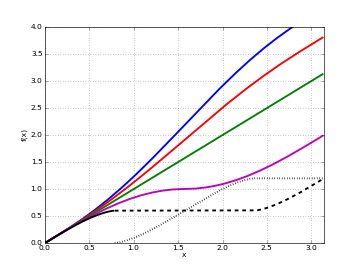
Examples for the complete integral
Basic values and limits:
>>> from mpmath import * >>> mp.dps = 25; mp.pretty = True >>> ellipe(0) 1.570796326794896619231322 >>> ellipe(1) 1.0 >>> ellipe(-1) 1.910098894513856008952381 >>> ellipe(2) (0.5990701173677961037199612 + 0.5990701173677961037199612j) >>> ellipe(inf) (0.0 + +infj) >>> ellipe(-inf) +inf
Verifying the defining integral and hypergeometric representation:
>>> ellipe(0.5) 1.350643881047675502520175 >>> quad(lambda t: sqrt(1-0.5*sin(t)**2), [0, pi/2]) 1.350643881047675502520175 >>> pi/2*hyp2f1(0.5,-0.5,1,0.5) 1.350643881047675502520175
Evaluation is supported for arbitrary complex
>>> ellipe(0.5+0.25j) (1.360868682163129682716687 - 0.1238733442561786843557315j) >>> ellipe(3+4j) (1.499553520933346954333612 - 1.577879007912758274533309j)
A definite integral:
>>> quad(ellipe, [0,1]) 1.333333333333333333333333
Examples for the incomplete integral
Basic values and limits:
>>> ellipe(0,1) 0.0 >>> ellipe(0,0) 0.0 >>> ellipe(1,0) 1.0 >>> ellipe(2+3j,0) (2.0 + 3.0j) >>> ellipe(1,1); sin(1) 0.8414709848078965066525023 0.8414709848078965066525023 >>> ellipe(pi/2, -0.5); ellipe(-0.5) 1.751771275694817862026502 1.751771275694817862026502 >>> ellipe(pi/2, 1); ellipe(-pi/2, 1) 1.0 -1.0 >>> ellipe(1.5, 1) 0.9974949866040544309417234
Comparing with numerical integration:
>>> z,m = 0.5, 1.25 >>> ellipe(z,m) 0.4740152182652628394264449 >>> quad(lambda t: sqrt(1-m*sin(t)**2), [0,z]) 0.4740152182652628394264449
The arguments may be complex numbers:
>>> ellipe(3j, 0.5) (0.0 + 7.551991234890371873502105j) >>> ellipe(3+4j, 5-6j) (24.15299022574220502424466 + 75.2503670480325997418156j) >>> k = 35 >>> z,m = 2+3j, 1.25 >>> ellipe(z+pi*k,m); ellipe(z,m) + 2*k*ellipe(m) (48.30138799412005235090766 + 17.47255216721987688224357j) (48.30138799412005235090766 + 17.47255216721987688224357j)
For
appellf1()):>>> z,m = 0.5, 0.25 >>> ellipe(z,m) 0.4950017030164151928870375 >>> sin(z)*appellf1(0.5,0.5,-0.5,1.5,sin(z)**2,m*sin(z)**2) 0.4950017030164151928870376
ellippi()¶
- mpmath.ellippi(*args)¶
Called with three arguments
Called with two arguments
In the defining integral, it is assumed that the principal branch of the square root is taken and that the path of integration avoids crossing any branch cuts. Outside
Plots
# Elliptic integral Pi(n,z,m) for some different n, m f1 = lambda z: ellippi(0.9,z,0.9) f2 = lambda z: ellippi(0.5,z,0.5) f3 = lambda z: ellippi(-2,z,-0.9) f4 = lambda z: ellippi(-0.5,z,0.5) f5 = lambda z: ellippi(-1,z,0.5) plot([f1,f2,f3,f4,f5], [0,pi], [0,4])
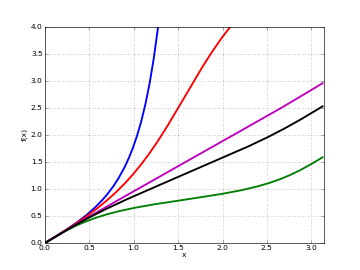
Examples for the complete integral
Some basic values and limits:
>>> from mpmath import * >>> mp.dps = 25; mp.pretty = True >>> ellippi(0,-5); ellipk(-5) 0.9555039270640439337379334 0.9555039270640439337379334 >>> ellippi(inf,2) 0.0 >>> ellippi(2,inf) 0.0 >>> abs(ellippi(1,5)) +inf >>> abs(ellippi(0.25,1)) +inf
Evaluation in terms of simpler functions:
>>> ellippi(0.25,0.25); ellipe(0.25)/(1-0.25) 1.956616279119236207279727 1.956616279119236207279727 >>> ellippi(3,0); pi/(2*sqrt(-2)) (0.0 - 1.11072073453959156175397j) (0.0 - 1.11072073453959156175397j) >>> ellippi(-3,0); pi/(2*sqrt(4)) 0.7853981633974483096156609 0.7853981633974483096156609
Examples for the incomplete integral
Basic values and limits:
>>> ellippi(0.25,-0.5); ellippi(0.25,pi/2,-0.5) 1.622944760954741603710555 1.622944760954741603710555 >>> ellippi(1,0,1) 0.0 >>> ellippi(inf,0,1) 0.0 >>> ellippi(0,0.25,0.5); ellipf(0.25,0.5) 0.2513040086544925794134591 0.2513040086544925794134591 >>> ellippi(1,1,1); (log(sec(1)+tan(1))+sec(1)*tan(1))/2 2.054332933256248668692452 2.054332933256248668692452 >>> ellippi(0.25, 53*pi/2, 0.75); 53*ellippi(0.25,0.75) 135.240868757890840755058 135.240868757890840755058 >>> ellippi(0.5,pi/4,0.5); 2*ellipe(pi/4,0.5)-1/sqrt(3) 0.9190227391656969903987269 0.9190227391656969903987269
Complex arguments are supported:
>>> ellippi(0.5, 5+6j-2*pi, -7-8j) (-0.3612856620076747660410167 + 0.5217735339984807829755815j)
Some degenerate cases:
>>> ellippi(1,1) +inf >>> ellippi(1,0) +inf >>> ellippi(1,2,0) +inf >>> ellippi(1,2,1) +inf >>> ellippi(1,0,1) 0.0
Carlson symmetric elliptic integrals¶
elliprf()¶
- mpmath.elliprf(x, y, z)¶
Evaluates the Carlson symmetric elliptic integral of the first kind
which is defined for
For real
Examples
Some basic values and limits:
>>> from mpmath import * >>> mp.dps = 25; mp.pretty = True >>> elliprf(0,1,1); pi/2 1.570796326794896619231322 1.570796326794896619231322 >>> elliprf(0,1,inf) 0.0 >>> elliprf(1,1,1) 1.0 >>> elliprf(2,2,2)**2 0.5 >>> elliprf(1,0,0); elliprf(0,0,1); elliprf(0,1,0); elliprf(0,0,0) +inf +inf +inf +inf
Representing complete elliptic integrals in terms of
>>> m = mpf(0.75) >>> ellipk(m); elliprf(0,1-m,1) 2.156515647499643235438675 2.156515647499643235438675 >>> ellipe(m); elliprf(0,1-m,1)-m*elliprd(0,1-m,1)/3 1.211056027568459524803563 1.211056027568459524803563
Some symmetries and argument transformations:
>>> x,y,z = 2,3,4 >>> elliprf(x,y,z); elliprf(y,x,z); elliprf(z,y,x) 0.5840828416771517066928492 0.5840828416771517066928492 0.5840828416771517066928492 >>> k = mpf(100000) >>> elliprf(k*x,k*y,k*z); k**(-0.5) * elliprf(x,y,z) 0.001847032121923321253219284 0.001847032121923321253219284 >>> l = sqrt(x*y) + sqrt(y*z) + sqrt(z*x) >>> elliprf(x,y,z); 2*elliprf(x+l,y+l,z+l) 0.5840828416771517066928492 0.5840828416771517066928492 >>> elliprf((x+l)/4,(y+l)/4,(z+l)/4) 0.5840828416771517066928492
Comparing with numerical integration:
>>> x,y,z = 2,3,4 >>> elliprf(x,y,z) 0.5840828416771517066928492 >>> f = lambda t: 0.5*((t+x)*(t+y)*(t+z))**(-0.5) >>> q = extradps(25)(quad) >>> q(f, [0,inf]) 0.5840828416771517066928492
With the following arguments, the square root in the integrand becomes discontinuous at
>>> x,y,z = j-1,j,0 >>> elliprf(x,y,z) (0.7961258658423391329305694 - 1.213856669836495986430094j) >>> -q(f, [0,0.5]) + q(f, [0.5,inf]) (0.7961258658423391329305694 - 1.213856669836495986430094j)
The so-called first lemniscate constant, a transcendental number:
>>> elliprf(0,1,2) 1.31102877714605990523242 >>> extradps(25)(quad)(lambda t: 1/sqrt(1-t**4), [0,1]) 1.31102877714605990523242 >>> gamma('1/4')**2/(4*sqrt(2*pi)) 1.31102877714605990523242
References
elliprc()¶
- mpmath.elliprc(x, y, pv=True)¶
Evaluates the degenerate Carlson symmetric elliptic integral of the first kind
If
If
Examples
Some special values and limits:
>>> from mpmath import * >>> mp.dps = 25; mp.pretty = True >>> elliprc(1,2)*4; elliprc(0,1)*2; +pi 3.141592653589793238462643 3.141592653589793238462643 3.141592653589793238462643 >>> elliprc(1,0) +inf >>> elliprc(5,5)**2 0.2 >>> elliprc(1,inf); elliprc(inf,1); elliprc(inf,inf) 0.0 0.0 0.0
Comparing with the elementary closed-form solution:
>>> elliprc('1/3', '1/5'); sqrt(7.5)*acosh(sqrt('5/3')) 2.041630778983498390751238 2.041630778983498390751238 >>> elliprc('1/5', '1/3'); sqrt(7.5)*acos(sqrt('3/5')) 1.875180765206547065111085 1.875180765206547065111085
Comparing with numerical integration:
>>> q = extradps(25)(quad) >>> elliprc(2, -3, pv=True) 0.3333969101113672670749334 >>> elliprc(2, -3, pv=False) (0.3333969101113672670749334 + 0.7024814731040726393156375j) >>> 0.5*q(lambda t: 1/(sqrt(t+2)*(t-3)), [0,3-j,6,inf]) (0.3333969101113672670749334 + 0.7024814731040726393156375j)
elliprj()¶
- mpmath.elliprj(x, y, z, p)¶
Evaluates the Carlson symmetric elliptic integral of the third kind
Like
elliprf(), the branch of the square root in the integrand is defined so as to be continuous along the path of integration for complex values of the arguments.Examples
Some values and limits:
>>> from mpmath import * >>> mp.dps = 25; mp.pretty = True >>> elliprj(1,1,1,1) 1.0 >>> elliprj(2,2,2,2); 1/(2*sqrt(2)) 0.3535533905932737622004222 0.3535533905932737622004222 >>> elliprj(0,1,2,2) 1.067937989667395702268688 >>> 3*(2*gamma('5/4')**2-pi**2/gamma('1/4')**2)/(sqrt(2*pi)) 1.067937989667395702268688 >>> elliprj(0,1,1,2); 3*pi*(2-sqrt(2))/4 1.380226776765915172432054 1.380226776765915172432054 >>> elliprj(1,3,2,0); elliprj(0,1,1,0); elliprj(0,0,0,0) +inf +inf +inf >>> elliprj(1,inf,1,0); elliprj(1,1,1,inf) 0.0 0.0 >>> chop(elliprj(1+j, 1-j, 1, 1)) 0.8505007163686739432927844
Scale transformation:
>>> x,y,z,p = 2,3,4,5 >>> k = mpf(100000) >>> elliprj(k*x,k*y,k*z,k*p); k**(-1.5)*elliprj(x,y,z,p) 4.521291677592745527851168e-9 4.521291677592745527851168e-9
Comparing with numerical integration:
>>> elliprj(1,2,3,4) 0.2398480997495677621758617 >>> f = lambda t: 1/((t+4)*sqrt((t+1)*(t+2)*(t+3))) >>> 1.5*quad(f, [0,inf]) 0.2398480997495677621758617 >>> elliprj(1,2+1j,3,4-2j) (0.216888906014633498739952 + 0.04081912627366673332369512j) >>> f = lambda t: 1/((t+4-2j)*sqrt((t+1)*(t+2+1j)*(t+3))) >>> 1.5*quad(f, [0,inf]) (0.216888906014633498739952 + 0.04081912627366673332369511j)
elliprd()¶
- mpmath.elliprd(x, y, z)¶
Evaluates the degenerate Carlson symmetric elliptic integral of the third kind or Carlson elliptic integral of the second kind
See
elliprj()for additional information.Examples
>>> from mpmath import * >>> mp.dps = 25; mp.pretty = True >>> elliprd(1,2,3) 0.2904602810289906442326534 >>> elliprj(1,2,3,3) 0.2904602810289906442326534
The so-called second lemniscate constant, a transcendental number:
>>> elliprd(0,2,1)/3 0.5990701173677961037199612 >>> extradps(25)(quad)(lambda t: t**2/sqrt(1-t**4), [0,1]) 0.5990701173677961037199612 >>> gamma('3/4')**2/sqrt(2*pi) 0.5990701173677961037199612
elliprg()¶
- mpmath.elliprg(x, y, z)¶
Evaluates the Carlson completely symmetric elliptic integral of the second kind
Examples
Evaluation for real and complex arguments:
>>> from mpmath import * >>> mp.dps = 25; mp.pretty = True >>> elliprg(0,1,1)*4; +pi 3.141592653589793238462643 3.141592653589793238462643 >>> elliprg(0,0.5,1) 0.6753219405238377512600874 >>> chop(elliprg(1+j, 1-j, 2)) 1.172431327676416604532822
A double integral that can be evaluated in terms of
>>> x,y,z = 2,3,4 >>> def f(t,u): ... st = fp.sin(t); ct = fp.cos(t) ... su = fp.sin(u); cu = fp.cos(u) ... return (x*(st*cu)**2 + y*(st*su)**2 + z*ct**2)**0.5 * st ... >>> nprint(mpf(fp.quad(f, [0,fp.pi], [0,2*fp.pi])/(4*fp.pi)), 13) 1.725503028069 >>> nprint(elliprg(x,y,z), 13) 1.725503028069
Jacobi theta functions¶
jtheta()¶
- mpmath.jtheta(n, z, q, derivative=0)¶
Computes the Jacobi theta function
The theta functions are functions of two variables:
The compact notations
Optionally,
jtheta(n, z, q, derivative=d)withExamples and basic properties
Considered as functions of
>>> from mpmath import * >>> mp.dps = 25; mp.pretty = True >>> jtheta(1, 0.25, '0.2') 0.2945120798627300045053104 >>> jtheta(1, 0.25 + 2*pi, '0.2') 0.2945120798627300045053104
Indeed, the series defining the theta functions are essentially trigonometric Fourier series. The coefficients can be retrieved using
fourier():>>> mp.dps = 10 >>> nprint(fourier(lambda x: jtheta(2, x, 0.5), [-pi, pi], 4)) ([0.0, 1.68179, 0.0, 0.420448, 0.0], [0.0, 0.0, 0.0, 0.0, 0.0])
The Jacobi theta functions are also so-called quasiperiodic functions of
>>> mp.dps = 25 >>> tau = 3*j/10 >>> q = exp(pi*j*tau) >>> z = 10 >>> jtheta(4, z+tau*pi, q) (-0.682420280786034687520568 + 1.526683999721399103332021j) >>> -exp(-2*j*z)/q * jtheta(4, z, q) (-0.682420280786034687520568 + 1.526683999721399103332021j)
The Jacobi theta functions satisfy a huge number of other functional equations, such as the following identity (valid for any
>>> q = mpf(3)/10 >>> jtheta(3,0,q)**4 6.823744089352763305137427 >>> jtheta(2,0,q)**4 + jtheta(4,0,q)**4 6.823744089352763305137427
Extensive listings of identities satisfied by the Jacobi theta functions can be found in standard reference works.
The Jacobi theta functions are related to the gamma function for special arguments:
>>> jtheta(3, 0, exp(-pi)) 1.086434811213308014575316 >>> pi**(1/4.) / gamma(3/4.) 1.086434811213308014575316
jtheta()supports arbitrary precision evaluation and complex arguments:>>> mp.dps = 50 >>> jtheta(4, sqrt(2), 0.5) 2.0549510717571539127004115835148878097035750653737 >>> mp.dps = 25 >>> jtheta(4, 1+2j, (1+j)/5) (7.180331760146805926356634 - 1.634292858119162417301683j)
Evaluation of derivatives:
>>> mp.dps = 25 >>> jtheta(1, 7, 0.25, 1); diff(lambda z: jtheta(1, z, 0.25), 7) 1.209857192844475388637236 1.209857192844475388637236 >>> jtheta(1, 7, 0.25, 2); diff(lambda z: jtheta(1, z, 0.25), 7, 2) -0.2598718791650217206533052 -0.2598718791650217206533052 >>> jtheta(2, 7, 0.25, 1); diff(lambda z: jtheta(2, z, 0.25), 7) -1.150231437070259644461474 -1.150231437070259644461474 >>> jtheta(2, 7, 0.25, 2); diff(lambda z: jtheta(2, z, 0.25), 7, 2) -0.6226636990043777445898114 -0.6226636990043777445898114 >>> jtheta(3, 7, 0.25, 1); diff(lambda z: jtheta(3, z, 0.25), 7) -0.9990312046096634316587882 -0.9990312046096634316587882 >>> jtheta(3, 7, 0.25, 2); diff(lambda z: jtheta(3, z, 0.25), 7, 2) -0.1530388693066334936151174 -0.1530388693066334936151174 >>> jtheta(4, 7, 0.25, 1); diff(lambda z: jtheta(4, z, 0.25), 7) 0.9820995967262793943571139 0.9820995967262793943571139 >>> jtheta(4, 7, 0.25, 2); diff(lambda z: jtheta(4, z, 0.25), 7, 2) 0.3936902850291437081667755 0.3936902850291437081667755
Possible issues
For
jtheta()raisesValueError. This exception is also raised for>>> jtheta(1, 10, 0.99999999 * exp(0.5*j)) Traceback (most recent call last): ... ValueError: abs(q) > THETA_Q_LIM = 1.000000
Jacobi elliptic functions¶
ellipfun()¶
- mpmath.ellipfun(kind, u=None, m=None, q=None, k=None, tau=None)¶
Computes any of the Jacobi elliptic functions, defined in terms of Jacobi theta functions as
or more generally computes a ratio of two such functions. Here
nome()). Optionally, you can specify the nome directly instead ofq=<value>, or you can directly specify the elliptic parameterk=<value>.The first argument should be a two-character string specifying the function using any combination of
's','c','d','n'. These letters respectively denote the basic functions'ns'identifies the functionand
'cd'identifies the functionIf called with only the first argument, a function object evaluating the chosen function for given arguments is returned.
Examples
Basic evaluation:
>>> from mpmath import * >>> mp.dps = 25; mp.pretty = True >>> ellipfun('cd', 3.5, 0.5) -0.9891101840595543931308394 >>> ellipfun('cd', 3.5, q=0.25) 0.07111979240214668158441418
The sn-function is doubly periodic in the complex plane with periods
ellipk()):>>> sn = ellipfun('sn') >>> sn(2, 0.25) 0.9628981775982774425751399 >>> sn(2+4*ellipk(0.25), 0.25) 0.9628981775982774425751399 >>> chop(sn(2+2*j*ellipk(1-0.25), 0.25)) 0.9628981775982774425751399
The cn-function is doubly periodic with periods
>>> cn = ellipfun('cn') >>> cn(2, 0.25) -0.2698649654510865792581416 >>> cn(2+4*ellipk(0.25), 0.25) -0.2698649654510865792581416 >>> chop(cn(2+2*ellipk(0.25)+2*j*ellipk(1-0.25), 0.25)) -0.2698649654510865792581416
The dn-function is doubly periodic with periods
>>> dn = ellipfun('dn') >>> dn(2, 0.25) 0.8764740583123262286931578 >>> dn(2+2*ellipk(0.25), 0.25) 0.8764740583123262286931578 >>> chop(dn(2+4*j*ellipk(1-0.25), 0.25)) 0.8764740583123262286931578
Modular functions¶
eta()¶
- mpmath.eta(tau)¶
Returns the Dedekind eta function of tau in the upper half-plane.
>>> from mpmath import * >>> mp.dps = 25; mp.pretty = True >>> eta(1j); gamma(0.25) / (2*pi**0.75) (0.7682254223260566590025942 + 0.0j) 0.7682254223260566590025942 >>> tau = sqrt(2) + sqrt(5)*1j >>> eta(-1/tau); sqrt(-1j*tau) * eta(tau) (0.9022859908439376463573294 + 0.07985093673948098408048575j) (0.9022859908439376463573295 + 0.07985093673948098408048575j) >>> eta(tau+1); exp(pi*1j/12) * eta(tau) (0.4493066139717553786223114 + 0.3290014793877986663915939j) (0.4493066139717553786223114 + 0.3290014793877986663915939j) >>> f = lambda z: diff(eta, z) / eta(z) >>> chop(36*diff(f,tau)**2 - 24*diff(f,tau,2)*f(tau) + diff(f,tau,3)) 0.0
kleinj()¶
- mpmath.kleinj(tau=None, **kwargs)¶
Evaluates the Klein j-invariant, which is a modular function defined for
where
An alternative, common notation is that of the j-function
Plots
# Klein J-function as function of the number-theoretic nome fp.cplot(lambda q: fp.kleinj(qbar=q), [-1,1], [-1,1], points=50000)
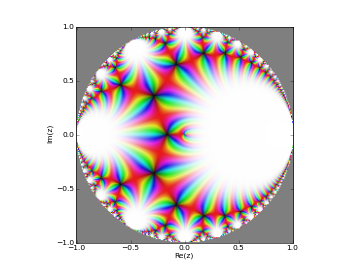
# Klein J-function as function of the half-period ratio fp.cplot(lambda t: fp.kleinj(tau=t), [-1,2], [0,1.5], points=50000)
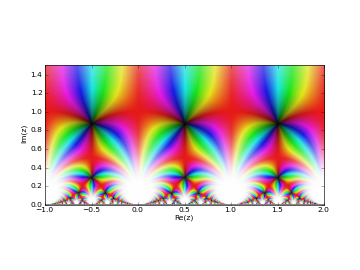
Examples
Verifying the functional equation
>>> from mpmath import * >>> mp.dps = 25; mp.pretty = True >>> tau = 0.625+0.75*j >>> tau = 0.625+0.75*j >>> kleinj(tau) (-0.1507492166511182267125242 + 0.07595948379084571927228948j) >>> kleinj(tau+1) (-0.1507492166511182267125242 + 0.07595948379084571927228948j) >>> kleinj(-1/tau) (-0.1507492166511182267125242 + 0.07595948379084571927228946j)
The j-function has a famous Laurent series expansion in terms of the nome
>>> mp.dps = 15 >>> taylor(lambda q: 1728*q*kleinj(qbar=q), 0, 5, singular=True) [1.0, 744.0, 196884.0, 21493760.0, 864299970.0, 20245856256.0]
The j-function admits exact evaluation at special algebraic points related to the Heegner numbers 1, 2, 3, 7, 11, 19, 43, 67, 163:
>>> @extraprec(10) ... def h(n): ... v = (1+sqrt(n)*j) ... if n > 2: ... v *= 0.5 ... return v ... >>> mp.dps = 25 >>> for n in [1,2,3,7,11,19,43,67,163]: ... n, chop(1728*kleinj(h(n))) ... (1, 1728.0) (2, 8000.0) (3, 0.0) (7, -3375.0) (11, -32768.0) (19, -884736.0) (43, -884736000.0) (67, -147197952000.0) (163, -262537412640768000.0)
Also at other special points, the j-function assumes explicit algebraic values, e.g.:
>>> chop(1728*kleinj(j*sqrt(5))) 1264538.909475140509320227 >>> identify(cbrt(_)) # note: not simplified '((100+sqrt(13520))/2)' >>> (50+26*sqrt(5))**3 1264538.909475140509320227